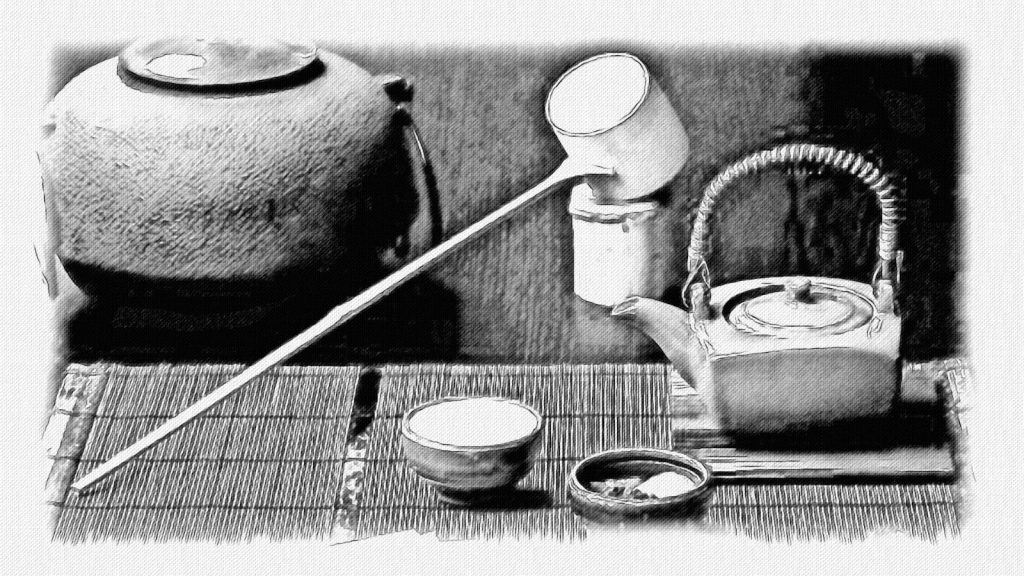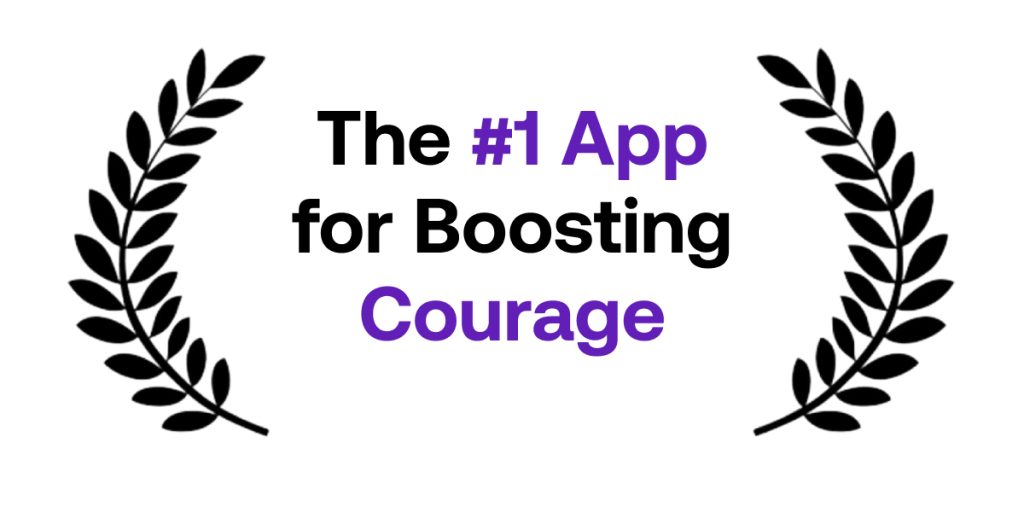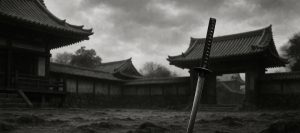Prelude: The Samurai and the Tea Master
Centuries ago during Japan’s Edo period, there was a tea master whose craft was impeccable: his setting of the cups, sifting of the leaves, pouring of the tea was all a work of art that was stunning to behold. This tea master was so renowned, in fact, that his lord gave him the title of Samurai, and the attire to match.
But not all were receptive to his rank. One day, the tea master happened to cross paths with an intimidating samurai warrior who immediately noticed something strange about this small, diminutive tea master wearing samurai robes.
“Tell me,” the samurai warrior asked, “who are you and why are you dressed like this?”
The tea master explained that his lord had given him the title of a samurai, and that he requires him to wear the robes. But this explanation did not sit well with the warrior, who had gone through years of gruelling physical training to achieve the title of samurai. He challenged the tea master to a duel the following day to prove his worth as a samurai.
Filled with fear, the tea master accepted the samurai’s conditions and scampered away. HIs friends offered to pool their money together and offer the samurai a bribe to call off the duel. One offered to hide him and transport the tea master and his family to another prefecture, where he could start a new life.
But the tea master thought of his ancestors, his family, and his lord, and the shame that these solutions would bring them. Even though it terrified him, he knew there was only one path: he must face this samurai. Not trained in the art of war, the tea master prepared for his own death. He turned to his lord for some advice.
“Lord, you have given me the title of samurai but not the training,” he said. “Please, teach me how to die like a samurai.”
“I will teach you,” the lord replied, “but first, one last time, I must ask you to prepare me a cup of tea.”
This was a request the tea master could not refuse. And he set the cups, sifted the leaves, and poured the tea with the same grace and mindfulness as he had done thousands of times before, and as he did, for a brief moment, the fear left his face. As he delicately poured the last drop, the lord looked at him.
“You see,” the lord stated. “I have nothing to teach you. Approach the duel with the same state of mind as you have the tea ceremony, and imagine you are serving your challenger. Graciously accept him, bow with courtesy, calmly observe him and caress your weapon as you unsheath it. Do all this with the same serenity you approach the tea ceremony, and you will be able to face your fears and die with honor.”
These words were of little comfort to the tea master, but he followed them the following day as he approached the duel, taking the same care with these actions as he did during a tea ceremony.
NEW! Put the principles from this article into practice with the free courage-boosting MaArtial app on the App Store for iOs and Play Store for Android.
The samurai warrior, expecting to observe terror in the tea master’s eyes, was himself shaken to see the care and consideration with which he performed his actions.
“I apologize,” the warrior said. “But I have misjudged you. You may lack the appearance of a samurai, but you clearly have the courage of one.” And he bowed to the tea master, and walked away.
Afterwards, the tea master told his lord what happened.
“Do you see now?” the lord asked. “I did not bestow upon you the title of samurai. I simply acknowledged what was clear to see.”
The story of the tea master and the samurai helps illustrate the definition of courage as described in the Bushido, the code of the samurai that has been passed down for centuries in Japan. These warriors no longer exist, however their core tenets are still highly valued in even today.
As outlined in Inazo Nitobe’s book Bushido: The Soul of Japan, courage is one of the eight core tenets and consists of two parts: the ability to decide what is morally right, and the action taken to support that decision.
The tea master in the earlier story knew what the correct decision was, and resolved himself to approach it, even though he feared the outcome. He thought he didn’t have the courage to carry through the action needed, but discovered he already had it within himself.
You too can call upon your inner courage to fight for what you know is right. Have you ever been in a situation where you didn’t stand up for yourself?
Maybe you had the opportunity to share your thoughts during a meeting but didn’t speak up. Perhaps you didn’t tell someone how you really felt and missed a chance to fulfill a dream. Or maybe you’d like to start your own business, but fear of failure is holding you back.
When reflecting back on these situations, it is normal to feel regret as you didn’t take action to achieve what you really wanted.
However, you have the strength within to take risks and confront challenges. Even if you don’t immediately recognize it within yourself, you have the courage to stand up for yourself with confidence and realize your full potential.
The True Nature of Courage
In today’s world, courage is often misunderstood as a lack of fear. But this is not the case: courage is about doing what is right, irrespective of fear or even using fear as motivation. There is no courage without fear. The two complement each other as yin and yang.
Courage is often mistaken with being reckless. Courage is taking a calculated risk that you are prepared for, like seizing an opportunity when it arises to improve your life.
Regular display of courage builds self-confidence over time, and helps you achieve results which might seem impossible or difficult to achieve. Courage is also like a muscle: something that can be trained over time and utilized when needed the most.
The story of the tea master and the samurai helps illustrate the definition of courage as described in the Bushido, the code of the samurai that has been passed down for centuries in Japan. These warriors no longer exist, however their core tenets are still highly valued in even today.
As outlined in Inazo Nitobe’s book Bushido: The Soul of Japan, courage is one of the eight core tenets and consists of two parts: the ability to decide what is morally right, and the action taken to support that decision.
The tea master in the earlier story knew what the correct decision was, and resolved himself to approach it, even though he feared the outcome. He thought he didn’t have the courage to carry through the action needed, but discovered he already had it within himself.
You too can call upon your inner courage to fight for what you know is right.
Have you ever been in a situation where you didn’t stand up for yourself?
Maybe you had the opportunity to share your thoughts during a meeting but didn’t speak up. Perhaps you didn’t tell someone how you really felt and missed a chance to fulfill a dream. Or maybe you’d like to start your own business, but fear of failure is holding you back.
When reflecting back on these situations, it is normal to feel regret as you didn’t take action to achieve what you really wanted.
However, you have the strength within to take risks and confront challenges. Even if you don’t immediately recognize it within yourself, you have the courage to stand up for yourself with confidence and realize your full potential.
In today’s world, courage is often misunderstood as a lack of fear. But this is not the case: courage is about doing what is right, irrespective of fear or even using fear as motivation. There is no courage without fear. The two complement each other as yin and yang.
Courage is often mistaken with being reckless. Courage is taking a calculated risk that you are prepared for, like seizing an opportunity when it arises to improve your life.
Regular display of courage builds self-confidence over time, and helps you achieve results which might seem impossible or difficult to achieve. Courage is also like a muscle: something that can be trained over time and utilized when needed the most.
Summary
Courage can be realized in just a moment, but it’s the careful cultivation of that courage within ourselves that allows us to implement it when needed.
The following rituals, based on principles sourced from the samurai code and other timeless wisdom, are designed to help you connect with your inner courage.
In practicing them regularly, you will be training yourself to be able wield courage when you truly need to.
Good learning and enjoy the journey.












